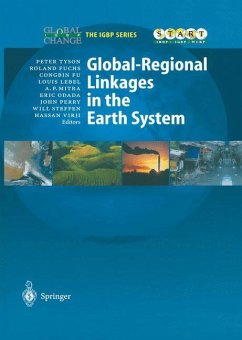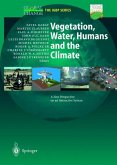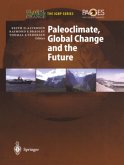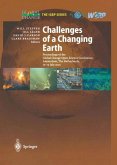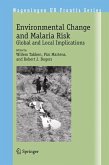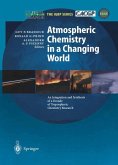Global environmental change occupies a central niche in the pantheon of modern sciences. There is an urgent need to know and understand the way in which global biogeochemical cycles have changed over different time scales in the past and are likely to do so in the future. Equally important, it is necessary to determine the extent to which natural variability and that induce by anthropogenic activities are bringing about change. A number of international co-operative scientific programmes ad dress these issues. Chief among them are the International Geosphere-Biosphere Programme (IGBP), the World Climate Research Programme (WCRP) and the Inter national Human Dimensions Programme (IHDP) for global change. This book is one of a series of IGBP syntheses drawing together findings in global environmental change over the past decade or so. One focus of IGBP activities is the System for Analysis, Research and Training (START). Co-sponsored by the WCRP and IHDP, START establishes regionalresearch networks for global change science in developing countries, stimulates and carries out global change research in developing regions of the world, and builds capacity to undertake such research at personal, institutional and regional levels. Several regional global change networks have been established, and much regional research has been accomplished in the last five years or so. In this book, work relating to four of the older START regions, Southern Africa, South Asia, Southeast Asia and East Asia, will be used as case studies to illustrate regional-global linkages in Earth System Science.
From the reviews:
"Global environmental changes have different effects in different regions of the world. That is why it is important to understand linkages between regions and the global system. This book contributes to this understanding in an outstanding way. ... the book most convincingly shows that an integrated approach to studying regional environmental change in its own right is a powerful tool for enhancing understanding of the Earth System at a global scale. ... it is most accessibly written and well illustrated ... ." (Luc Hens, International Journal of Environment and Pollution, Vol. 21 (5), 2004)
"The System for Analysis, Research and Training (START) was established ... to build global change research capacity in developing regions. ... The book reveals the extent to which the START program has succeeded to date, by presenting up-to-date reviews of global change science ... . This book is a significant resource for anyone interested in global change and its impacts in the developing regions of the world ... . I recommend it as a reference text ... . Every academic library should have a copy." (Janette Lindesay, Australian Meteorological Magazine, Vol. 52 (4), 2003)
"Environmental change cannot be summed up in terms of one single, undisputable alteration in the Earth's system. ... The effort made by Global-regional linkages in the Earth system to holistically examine linkages between regions and the global system is an important step in this regard. ... The book is richly illustrated with figures and tables of high quality ... . The text reviews a wealth of detailed scientific evidence ... . Undoubtedly, this book will be a useful source of information for many ... ." (Siri Eriksen, The Holocene, Vol. 13 (6), 2003)
"Publication of this book has been under the auspices of the International Geosphere-Biosphere Programme (IGBP) which is an international effort to understand more deeply global change. One focusof IGBP activities is the System for Analysis, Research and Training (START) ... . The book, written by developing country scientists involved in START, is professionally made and should be consulted by those who want to get a fast overview over the environmental topics that are central for the respective region of the world." (M. Hantel, Meteorologische Zeitschrift, Vol. 12 (1), 2003)
"Global environmental changes have different effects in different regions of the world. That is why it is important to understand linkages between regions and the global system. This book contributes to this understanding in an outstanding way. ... the book most convincingly shows that an integrated approach to studying regional environmental change in its own right is a powerful tool for enhancing understanding of the Earth System at a global scale. ... it is most accessibly written and well illustrated ... ." (Luc Hens, International Journal of Environment and Pollution, Vol. 21 (5), 2004)
"The System for Analysis, Research and Training (START) was established ... to build global change research capacity in developing regions. ... The book reveals the extent to which the START program has succeeded to date, by presenting up-to-date reviews of global change science ... . This book is a significant resource for anyone interested in global change and its impacts in the developing regions of the world ... . I recommend it as a reference text ... . Every academic library should have a copy." (Janette Lindesay, Australian Meteorological Magazine, Vol. 52 (4), 2003)
"Environmental change cannot be summed up in terms of one single, undisputable alteration in the Earth's system. ... The effort made by Global-regional linkages in the Earth system to holistically examine linkages between regions and the global system is an important step in this regard. ... The book is richly illustrated with figures and tables of high quality ... . The text reviews a wealth of detailed scientific evidence ... . Undoubtedly, this book will be a useful source of information for many ... ." (Siri Eriksen, The Holocene, Vol. 13 (6), 2003)
"Publication of this book has been under the auspices of the International Geosphere-Biosphere Programme (IGBP) which is an international effort to understand more deeply global change. One focusof IGBP activities is the System for Analysis, Research and Training (START) ... . The book, written by developing country scientists involved in START, is professionally made and should be consulted by those who want to get a fast overview over the environmental topics that are central for the respective region of the world." (M. Hantel, Meteorologische Zeitschrift, Vol. 12 (1), 2003)

